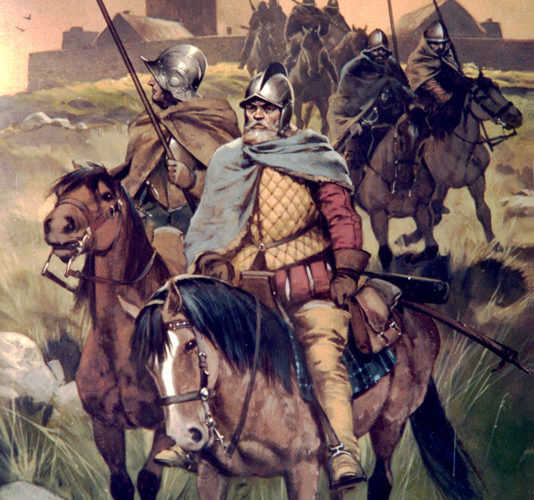Poor Carey. It seems nobody had bothered to tell him about Robert Kerr, one of the most notorious ruffians on the 'Godforsaken' Anglo-Scottish borderland. The aristocratic Englishman would soon learn.
To be fair, Kerr was a product of his time. He learned the dark arts of raiding and robbery for a living at a very young age: his first 'voyage on horseback' was made in 1585, when he was just fifteen (or even younger) at a raid on Stirling. Two years later he was a leader, along with the 'Bold Buccleuch' and Lord Johnstone, of a 2000-strong raid against the Collingwoods. This so displeased James VI that he forbade Kerr's marriage to Maitland of Lethington's daughter. Kerr duly thumbed his nose at the king and got married anyway.
His career went on as it had begun. At various times Kerr was forced to take refuge in England on charges of murder, and he got himself in a confusing tangle of feuds against English and Scottish reiver gangs. At one point he killed three men at Wooller, only to escape justice (such as it was), and then went into England looking for victims. Finding none, he spent the day in an alehouse at the local fair instead. John Carey, Robert's brother, remarked nervously in a letter that he didn't know what the world was coming to.
After years of killing and raiding, Kerr acquired the nickname of 'the fyrebrande of the border'. This was a tough world, and he must have been considered exceptionally brutal to stand out from all the other mob bosses. Even so, Robert Carey thought he could befriend the man and have a quiet border.
Fat chance. In his memoir, Carey indignantly records what followed. He sent an envoy to Kerr, who welcomed the man and gave him lodgings for the night. Kerr then wrote a friendly letter to Carey, in which he declared:
'He was glad to have the happiness to be acquainted with me, and did not doubt but the country would be the better governed by our good agreements'.
Hmm. Watch out, Carey, the wolf is smiling. The next day, Kerr entertained the English envoy to dinner and filled him up with strong drink. Then he put the man to bed and rode out with half a dozen of his followers. They crossed into England and came to a village. Carey describes what happened next:
'Then he [Kerr] broke up a house, and took out a fellow, who he pretended had done him some wrong, and before the door cruelly murdered him, and so came quietly home, and went to bed'.
Kerr and his men then rode home to Scotland. The next morning he gave Carey's envoy another friendly letter to take to his master, and sent the man off.
It seems the murder was commited as a crude warning to Carey: he and Kerr could not be friends, and there would be no peace on the border. When Carey learned of it, he was furious:
'When I heard what a brave (trick) he had put upon me, I quickly resolved what to do, which was, never to have to do with him till I was righted for the great wrong he had done me'.
The stage was set for a bitter feud.

No comments:
Post a Comment